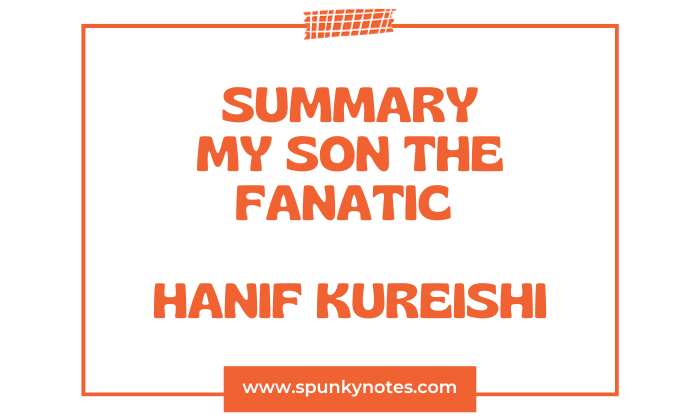
Q. Write the summary of the story My Son the Fanatic by Hanif Kureishi.
Introduction
The story “My Son the Fanatic” is set in London and captures the life of Parvez, a hardworking taxi driver from Pakistan. Parvez is worried because his son, Ali, is changing and not following the values he taught him.
Ali’s Transformation
Once an ordinary teenager with usual interests, Ali starts to display changes that alarm his father. Where once his room was a typical teenage mess, now everything is meticulously organized.
He begins to distance himself from his earlier circle of friends, and many of his treasured possessions are either given away or discarded.
Already struggling to understand these changes, Parvez grows even more anxious when Ali’s long-time girlfriend suddenly disappears.
Father’s Concerns
Parvez’s concerns are not baseless. Living in London, he is all too familiar with the distractions and pitfalls that can ensnare young people.
Stories he hears from his fellow taxi drivers about the youth getting involved in undesirable activities make him suspect that Ali might be involved in drug-related activities. As his worries amplify, Parvez finds solace in alcohol, attempting to drown his fears.
Seeking Advice
Feeling isolated and unsure about how to approach the situation, Parvez eventually shares his worries with his fellow taxi drivers. They quickly think Ali might use drugs. They strongly advise Parvez to spy on Ali and search his room for any evidence of drug consumption.
On a separate occasion, Parvez opens up to Bettina, a sex worker he knows very well. She gives him a different perspective. She suggests he should observe Ali’s physical condition, particularly the signs in his eyes, to see if he is using drugs.
Taking the advice to heart, Parvez becomes a silent observer of his own son. He watches Ali, noting his eating habits, monitoring his outings, and even rummaging through Ali’s room for evidence of drug usage.
After days of relentless observation and discussion with Bettina, Parvez concludes that drugs are not the issue. However, he stumbles upon a surprising discovery: Ali has taken up the practice of Islamic prayers.
Religious Revelation
Coming to terms with Ali’s newfound religious commitment is hard for Parvez. He had distanced himself from strict religious practices after some negative experiences in his childhood.
He tells his taxi driver friends about Ali’s change. They do not say much because they do not want to discuss religious beliefs. Resigned, Parvez understands that he must address this growing chasm with his son directly.
Dinner Confrontation
Parvez invites Ali to a cafe to bridge the widening gap, hoping a neutral setting might foster a genuine conversation. However, the dinner rapidly descends into a heated debate. With newfound fervor, Ali condemns Parvez’s habits, especially his drinking.
On the other hand, Parvez tries to explain the freedoms and opportunities they have received in England. Ali’s rejection of Western culture and increasingly fanatic beliefs shocked Parvez.
The relationship between Parvez and Ali becomes even more strained after their confrontation. Parvez tries to reason with Ali, emphasizing the virtues of a tolerant, non-judgmental life. Ali, however, counters with solid views about Muslims’ oppression and injustices, further deepening their divide.
Dramatic Encounter
A chance encounter between Parvez, Bettina, and Ali fuels the volatile situation. While driving Bettina, Parvez sees Ali walking and stops to engage him in conversation.
Ali’s reaction is aggressive, especially when he realizes Bettina’s profession. The situation escalates, leading to an intense and silent ride back home.
The Climax
Unable to contain his emotions after that fateful ride, Parvez, fueled by alcohol and desperation, confronts Ali in his room. The confrontation becomes physical, with Parvez attacking his son. Despite being hurt, Ali remains calm and delivers a poignant, reflective question to Parvez.
So who is the fanatic now?
At the end of “My Son the Fanatic,” the last line shows how Parvez sees a big difference between him and his religious son. It is about how immigrants like him and their children can have very different beliefs and values.
My Son the Fanatic Analysis
Hybridity and Identity Struggle
“My Son the Fanatic” prominently explores the concept of hybridity. While historically, hybridity was about racial mixing, it encompasses the blending of cultures, religions, and individual values in contemporary times.
Immigrants, like the story’s characters, often struggle with this concept when they transition to new cultures. They find themselves at the crossroads of their ancestral heritage and the values of their new surroundings.
Parvez, the father in the story, migrated from the East to the West. He wholeheartedly embraced London’s culture, freedoms, and opportunities in his quest to find a better life. He cherishes the Western lifestyle, distancing himself from his past and almost completely disregarding it.
On the flip side, his son Ali, born and raised in London, takes a different path. He strongly disagrees with Western values and strictly follows Islamic practices instead.
The story clearly shows two related people who make different choices about their mixed backgrounds. It creates a strong sense of tension between them.
Racial Ideology
Ali, in his youthful zeal, is firmly anchored in the belief that as a young Pakistani Muslim, he is duty-bound to oppose Western ideologies. He perceives the West as an inherent oppressor of his people and his beliefs.
Interestingly, this fierce conviction is not stemming from personal experiences or direct oppression. Instead, it is rooted in a broader racial ideology that he has come to adopt.
Ali views Parvez’s journey of assimilation into Western culture as nothing short of treachery. Ali’s rigid beliefs lead him to see his father’s adaptation and lifestyle choices, such as consuming alcohol, as a direct affront to their shared heritage.
Assimilation and Cultural Conflict
The story gives a detailed look at assimilation. It shows how individuals adopt new customs, traditions, and values from a different culture. Parvez’s journey is a testament to this. Having moved from the East, he endeavors to fit into the societal fabric of London seamlessly.
He believes that assimilation is the key to ensuring a prosperous and conflict-free life for his family in a foreign land. By adopting certain Western habits, he feels he is securing a better future for them.
However, Ali perceives this differently. Caught in a tumultuous phase of identity exploration, he finds himself rebelling against the very culture his father has come to embrace.
This internal conflict, juxtaposed against his father’s choices, creates a rift. Ali’s struggle is emblematic of many second-generation immigrants who grapple with finding a balance between their parents’ choices and their personal beliefs and values.
The narrative poignantly captures this tension, shedding light on the broader challenges many immigrants face in their journey of assimilation.

